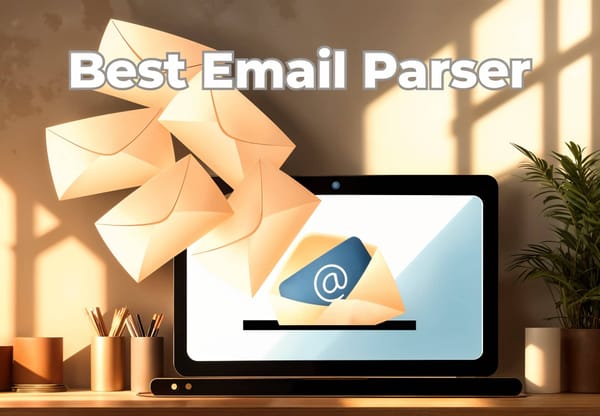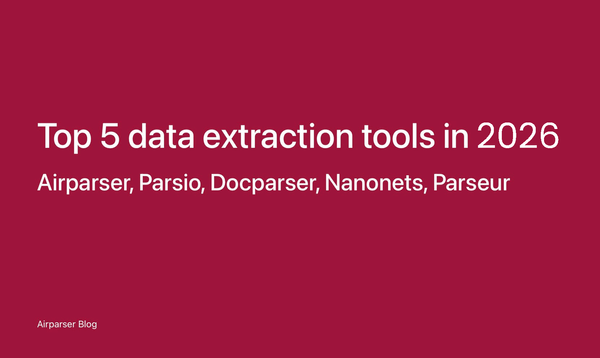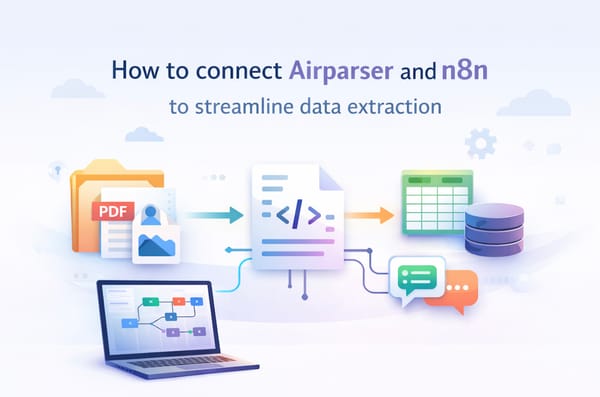Top 5 CV And Resume Parsers In 2026
Uncover the top 5 resume parsing software tools for 2026. We review the best resume parsers, their features, and pricing to enhance your recruitment process.

In 2026, scanning through endless resume applications is no longer a tedious task, thanks to advanced resume parsing software. These CV parsers use algorithms to extract key details from resumes.
Whether it's contact information, work experience, education, or skills, this software helps simplify the hiring process for HR teams and recruiters.
With the right CV and resume parsers, HR professionals can focus on finding the best candidates instead of sorting through stacks of documents. Based on recent updates, user feedback, features, and pricing, we've compiled a list of the top five CV and resume parsers to consider in 2026.
Quick Look
Here is our pick of the top 5 CV and resume parsers in 2026.
- Airparser — Advanced GPT-powered resume screening software.
- Affinda — Perfect for handling high-volume hiring needs.
- Docparser — Versatile parsing software with a Zonal OCR engine.
- Rchilli — Excellent for parsing resumes, with multilingual support and deep learning capabilities.
- Sovren — Top choice for AI-powered search and match features with advanced data enrichment APIs.
1. Airparser
Airparser is a standout in the 2026 lineup of CV and resume parsers. It seamlessly extracts, interprets, and organizes structured data from various formats—be it emails, PDFs, CVs, resumes, images, or even HTML by using AI ORC engine.

Key Features
This GPT-powered parsing tool excels at pulling out key details like names, work experience, and contact information, so every resume is parsed with speed and accuracy.
By leveraging advanced natural language processing, Airparser is trained to recognize typed, scanned, and handwritten texts in over 60 languages.
Beyond that, It automates the extraction process and further makes it easy for applicant tracking systems (ATS) and HR databases to process the data in a standardized format.
Integration is a breeze, with seamless connections to Zapier, and export options to Google Sheets, Slack, and Airtable.
Pros & Cons
Pros
- It utilizes GPT technology, allowing it to parse resumes and CVs in any particular format, even if the layout changes.
- User-friendly setup for noncoders.
- Cost-effective pricing.
Cons
- A general parser tool and it might lack some very domain-specific features for CV parsing.
Pricing
- The starter package starts at $39.
2. Affinda
Affinda is designed to accurately extract over 100 fields from resumes, making it an excellent choice for handling large volumes of data. This parser efficiently organizes work history, skills, objectives, personal details, education, certifications, and referees into easily searchable file formats.

Key Features
Accurate data extraction: Affinda delivers unparalleled accuracy in extracting data from resumes, with outputs available in Excel, JSON, or XML formats.
Flexibility and customization: The parser is highly adaptable, capable of recognizing industry-specific jargon.
Streamlined recruitment process: By efficiently organizing resume data, Affinda empowers HR teams to quickly identify the best candidates, speeding up the recruitment process.
Free trial: Affinda offers a free trial, allowing you to experience its capabilities.
Pros & Cons
Pros
- Easy integration with applicant tracking systems (ATS) and HR databases.
- Great quality parses, and super clean data!
- Saves a significant amount of time.
Cons
- Advanced features might necessitate a steep learning curve for novice users.
Pricing
- Starting at $80.
3. Docparser
Docparser leverages Zonal OCR technology to accurately extract data from specific areas of your PDF documents and images, making it a reliable choice for targeted data extraction.

Key Features
Once the data from resumes are parsed, it can be exported directly in multiple file formats, including CSV, Excel, JSON, and XML. T
You can use their API to bring in documents and get your parsed data. Plus, their webhook feature makes it possible to send extracted document data to any endpoint in real time.
Pros & Cons
Pros
- Precise data extraction.
- Supports multiple export formats.
- Integrates with third-party tools.
Cons
- Template setup can be time-consuming, requiring careful configuration.
- Zonal OCR struggles with CVs that have dynamic or varying layouts, limiting its flexibility for more complex documents.
Pricing
- Starts at $39/month for the Starter plan.
4. Rchilli
Renowned for its exceptional resume parsing and data enrichment capabilities, RChilli seamlessly integrates with various languages, models, and formats. Through automated matching, parsing, and scoring, it quickly identifies the most suitable candidates for any job position.

Key Features
RChilli uses a REST API to organize data into over 140 fields, making sure that every detail from resumes is captured accurately. It relies on deep learning to automatically parse and enrich resume data, no matter the layout or language.
This technology speeds up the hiring process, allowing companies to quickly and efficiently assess candidates. With RChilli, recruiters can focus on finding the right person for the job, confident that they have all the information they need.
Pros & Cons
Pros
- Rich taxonomy.
- Follows GDPR guidelines for data privacy & security.
- Versatile format compatibility.
Cons
- Complex setup may need technical expertise for customization.
Pricing
- Starts at $75/month.
5. Textkernel (ex Sovren)
Key Features
Textkernel, formerly known as Sovren, is a reliable and fast solution for accurately parsing resumes using AI. It excels at matching keywords in resumes with job descriptions quickly and efficiently. With advanced skills taxonomies, Textkernel helps identify key qualifications, making the hiring process smoother.
A standout feature of Textkernel is its ability to handle multilingual resume parsing, currently supporting 29 languages. This is particularly beneficial for companies aiming to recruit from a global talent pool. As a global leader in recruitment software, Textkernel is renowned for its precise resume data extraction, ensuring that top talent isn’t overlooked and can be hired swiftly.
Pros & Cons
Pros
- Highly customizable parsing choices to fit specific recruitment needs.
- Great accuracy.
- Support for multilingual resume parsing.
Cons
- Some users find the initial setup and customization of Sovren's parsing system to be complex and time-consuming. It may require a certain level of technical expertise to fully optimize the software for specific needs.
- The cost of using Sovren can be a concern, especially for smaller businesses
Pricing
- Starts at $99/month
Conclusion - A Few Final Words
In 2026, the advancements in artificial intelligence and machine learning have elevated the capabilities of these top five resume parsing tools — Airparser, Affinda, Docparser, RChilli, and Sovren — to new heights. Some of these tools leverage natural language processing to transform the recruitment landscape, enabling HR professionals to focus on core tasks like talent acquisition rather than getting bogged down in data entry.
As these technologies continue to evolve, they are poised to play an even more critical role in enhancing the hiring process and reshaping the future of recruitment.




